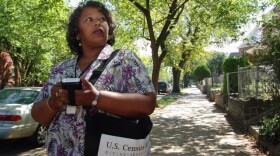Tuesday, Oct. 6, is the last day in New Mexico that you can register to vote by mail or online for this election, though you can register in-person at your county clerk's office up through Halloween.
More people are facing homelessness around the country, advocates say, though it’s hard to pin down numbers so far. And economists project the crisis could get worse. In New Mexico, people without a home address can still register and vote on the politicians who are making the decisions about jobs, rent and economic relief during the pandemic. KUNM with Rachel Biggs, policy director for Albuquerque’s Health Care For The Homeless. She’s working on voter registration and mobilization for the unhoused population here—and around the country.
RACHEL BIGGS: Unfortunately, each election, people with low incomes and people experiencing homelessness really vote at lower rates than people with higher incomes, despite the fact that many of the policies being decided at the polls really directly impact people that are economically disadvantaged. And not having the information is one of the barriers that definitely keeps people from registering and voting. But it is true: You, in fact, do not need a home to vote, and that you don't have to have a traditional residence to register to vote, and there's ways to do that.
KUNM: Why don't we know this?
BIGGS: I think historically, there's been a lot of structural issues that have kept people living with low incomes, living on the street, in those positions. And this is just another example of some of the structural issues that keep people from being able to participate in public-policy decisions that really affect their lives directly.
KUNM: That's absolutely ridiculous that we don't know this information, given what you said about the importance of these decisions. Tell me, how are you all working on that issue here in the state?
BIGGS: We're a federally qualified health center, and the health center movement really does do a lot around voter registration and help get-out-the-vote efforts. And so at Health Care for the Homeless, we do a lot of education around people's rights and making sure people understand that they can still register to vote. Not having an address can be overcome. You can draw a map on your registration ballot. You can indicate on the residence line that you're at a nontraditional address, and in fact, state the intersection that you reside closest to.
You do have to include a mailing address. This is important, so you don't get your ballot, your registration, thrown out. You can have a non-traditional address in that residence line, you can draw a map, but you still will have to include a mailing address. But this mailing address could be a P.O. box. It could be a friend or family member’s address or any other place to receive mail, and that mailing address does not have to be in the county that you reside in. It just needs to be an address where you can receive mail.
KUNM: Now nationwide, we've been hearing and seeing that more people are losing their homes or about to lose their homes due to the COVID-19 pandemic. And while the election might be the last thing on their minds, government officials made the calls during the pandemic that put people in that very position. How do you convince people that voting matters while they're going through such turmoil and hardship?
BIGGS: Public policy is really decided at the polls. And so, when we're having these conversations with individuals that are really going through a crisis—the experience of homelessness, losing your home is a high-crisis situation—but we really try to convey just how critically important it is for people that are in that position to use their voice to vote on the issues that are really directly affecting them, which includes affordable housing and access to health care, a living wage.
These are issues that just have a direct impact on people's lives right now in a really real way. And people are seeing this so clearly with COVID, and really seeing the connection between public policy and housing and homelessness.
And unfortunately, people are at really high risk of homelessness right now. We're anticipating an increase of 40 to 45 percent in people experiencing homelessness due to COVID. So we're preparing for that, and this is exactly why it's so important for people to exercise their right to vote and get to the polls and have an impact on these public-policy decisions.
KUNM: Are you seeing anything unusual nationally unfolding?
Of course, the biggest barrier that we're hearing from all of our partners is that mail-in ballot and people not having an address, and how hard that is for individuals to access a mail-in ballot and be able to vote by mail. Of course, we're really concerned with the impact of COVID on people experiencing homelessness being at particularly high-risk and particularly vulnerable to negative impacts from COVID. Going on General Election Day, being in congregate settings, the mail-in ballots would be obviously the best scenario, but that's hard for individuals without a steady address that they can receive mail for that mail-in ballot.
*****
This interview originally aired as part of Sunday’s episode of our show No More Normal, which is all about voting rights. Full episode below.






